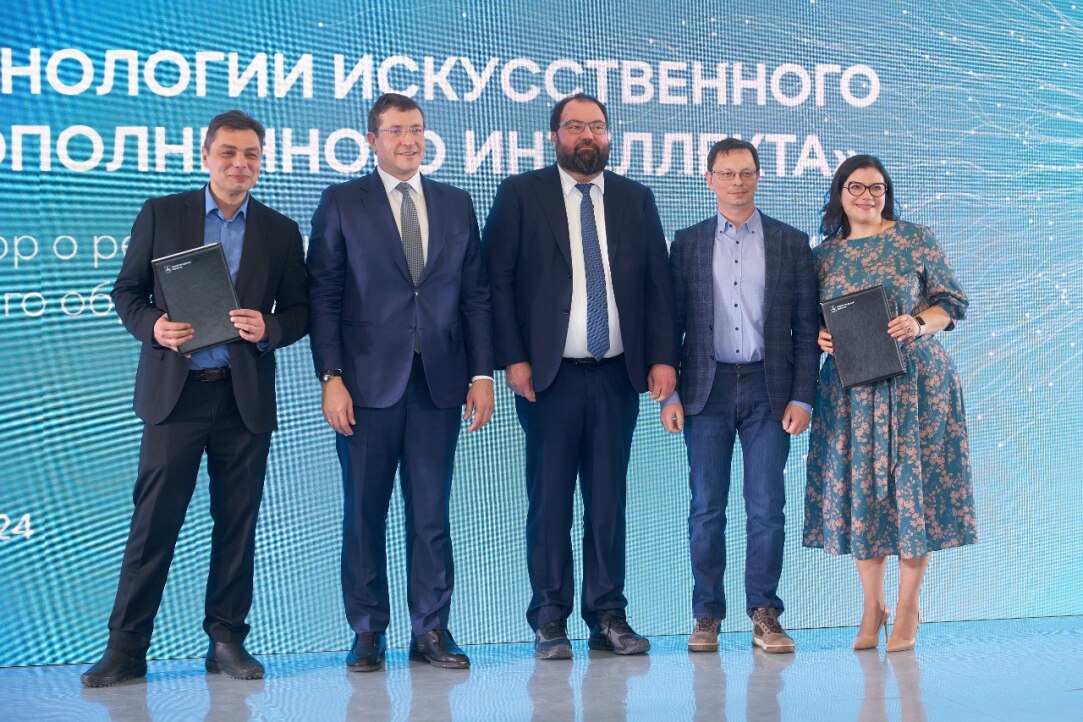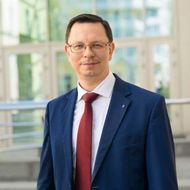HSE University and Neimark IT Campus Sign an Agreement on Launching an AI Network Programme

HSE University, together with the world-class Neimark IT campus, is preparing a unique professional environment for future IT specialists: to this end, an IT school will be created in the Nizhny Novgorod region, and on September 1st, the first network degree programme ‘Artificial and Augmented Intelligence Technologies’ will be launched at HSE University in Nizhny Novgorod.
The agreement on implementing the programme was signed in Nizhny Novgorod at a presentation on the complex development of an IT hub in the Nizhny Novgorod region which was delivered to the heads of federal IT corporations with the participation of the Minister of Digital Development, Communications and Mass Media of the Russian Federation Maksut Shadaev, Governor of the Nizhny Novgorod Region Gleb Nikitin and HSE University Rector Nikita Anisimov.
The agreement on the implementation of the first network programme of higher education ‘Artificial and Augmented Intelligence Technologies’ was signed by Anna Blyakhman, Director of HSE University in Nizhny Novgorod, and Valery Cherepennikov, Director of the Project Office of the Neimark IT Campus.
Students on the programme will study methods, models and concepts of artificial intelligence, acquire skills in the practical use of neural networks, image recognition and speech, and learn how to use data analysis and machine learning technologies throught the experiences of leading IT companies.

Gleb Nikitin
‘Artificial intelligence has become one of the key areas of training on the IT campus for a very good reason. Our region has accumulated serious experience in this area. Yuri Neimark stood at the origins of artificial intelligence in Gorky about half a century ago, and the OpenCV computer vision library, which Nizhny Novgorod engineers worked on, became a unique example of such products and features of IT in Nizhny Novgorod,’ says Gleb Nikitin, Governor of the Nizhny Novgorod region.
Admissions to the programme will open this year. Applicants must pass the Unified State Exam in mathematics, computer science and Russian language.
HSE University Rector Nikita Anisimov empahsised that the joint programme with the IT campus is unique in both its content and learning technology.
‘The programme combines the best teachers from HSE with experts from leading companies in the industry, who will jointly help students acquire skills on real projects. As a result, we will have highly qualified graduates with both the modern practical experience and soft skills necessary to solve problems of the future of the digital data economy,’ says HSE Rector.

Valery Cherepennikov
‘The programme is designed to give graduates a strong fundamental mathematical knowledge that provides the basis for intelligent solutions, and multiple practice-oriented courses that form skills in developing and implementing machine learning algorithms, as well as applying neural networks and deep learning to solve real problems. Industrial expertise and in-depth specialisation in these areas will be provided by the Neimark IT Campus. Throughout their study, students will participate in project activities, attend specialised courses from partners, workshops, and take part in special events. Thus, after graduation, we will have exceptional employees in great demand on the market,’ explaines Valery Cherepennikov.
‘For HSE University, the programme ‘Artificial and Augmented Intelligence Technologies’ is a natural step in the ongoing creation of an ecosystem for talented students who are passionate about IT technologies in Nizhny Novgorod. During their studies, students will be able to gain full-fledged developer experience, receive a number of additional certificates confirming their qualifications, and a ready-made portfolio of completed projects,’ adds Anna Blyakhman, Director of the HSE University in Nizhny Novgorod.
The projects for the development of the IT campus education system include creating a new educational space for future IT specialists, organised by the Neimark IT Campus and HSE University.
‘The project is unique not only due to its location within walking distance from the IT campus facilities, but also due to the concept of the educational process. We plan to enrol up to 1,600 school students into full-time studies. About a thousand more children from all over Russia will be able to study here remotely with modules in an offline format. The programme content will also be uniquel. It considers IT as a cross-cutting specialisation for all professional areas: from fintech and biotech to linguistics and urban studies,’ adds Gleb Nikitin.
See also:
HSE Scientists Propose AI-Driven Solutions for Medical Applications
Artificial intelligence will not replace medical professionals but can serve as an excellent assistant to them. Healthcare requires advanced technologies capable of rapidly analysing and monitoring patients' conditions. HSE scientists have integrated AI in preoperative planning and postoperative outcome evaluation for spinal surgery and developed an automated intelligent system to assess the biomechanics of the arms and legs.
HSE University and Sber Researchers to Make AI More Empathetic
Researchers at the HSE AI Research Centre and Sber AI Lab have developed a special system that, using large language models, will make artificial intelligence (AI) more emotional when communicating with a person. Multi-agent models, which are gaining popularity, will be engaged in the synthesis of AI emotions. The article on this conducted research was published as part of the International Joint Conference on Artificial Intelligence (IJCAI) 2024.
Neural Network for Assessing English Language Proficiency Developed at HSE University
The AI Lingua Neural Network has been collaboratively developed by the HSE University’s AI Research Centre, School of Foreign Languages, and online campus. The model has been trained on thousands of expert assessments of both oral and written texts. The system evaluates an individual's ability to communicate in English verbally and in writing.
HSE University and Yandex to Host International AI Olympiad for Students
The HSE Faculty of Computer Science and Yandex Education are launching their first joint AI competition, Artificial Intelligence and Data Analysis Olympiad (AIDAO), for students from around the world. Participants will tackle challenging tasks in science and industry and interact with experts from HSE and Yandex. The winners will receive cash prizes.
Winners of the International Olympiad in Artificial Intelligence Admitted to HSE University
In mid-August, Bulgaria hosted the finals of the first International Olympiad in Artificial Intelligence (IOAI) among high school students. The Russian team demonstrated excellent results, winning gold medals in the scientific round, silver medals in the practical round, and coming first in both rounds overall. This year two members of the Russian team were accepted into the programmes of the HSE Faculty of Computer Science.
Artificial and Augmented Intelligence: Connecting Business, Education and Science
The history of AI research in Nizhny Novgorod dates back to the 1960s and 1970s. Today, AI technologies, from voice assistants and smart home systems to digital twin creation and genome sequencing, are revolutionising our life. Natalia Aseeva, Dean of the Faculty of Informatics, Mathematics and Computer Science at HSE Campus in Nizhny Novgorod, discusses how the advancement of AI connects science, business, and education.
HSE University Leads the AI Alliance Ranking
The AI Alliance Russia has released a new ranking of Russian universities based on the quality of education in the field of AI. Similar to last year, HSE University has joined the leaders in A+ group alongside MIPT and ITMO. A total of 207 universities from 69 Russian regions participated in the ranking. In 2024, over 35,000 students were enrolled in AI-related programmes at these universities.
Reinforcement Learning Enhances Performance of Generative Flow Networks
Scientists at the AI Research Centre and the AI and Digital Science Institute of the HSE Faculty of Computer Science applied classical reinforcement learning algorithms to train generative flow networks (GFlowNets). This enabled significant performance improvements in GFlowNets, which have been employed for three years in tackling the most complex scientific challenges at modelling, hypothesis generation, and experimental design stages. The results of their work achieved a top 5% ranking among publications at the International Conference on Artificial Intelligence and Statistics AISTATS, held on May 2-4, 2024, in Valencia, Spain.
‘I Came Up with the Idea to Create an Application Useful for Practicing Physicians’
Dmitry Ryabtsev, a 2024 graduate of the master's programme at the HSE Faculty of Computer Science, created an AI-powered software service for ophthalmology during his two years of study. This product is now entering the market, and its developer plans to participate in establishing a working group on software engineering for medical applications at the HSE Faculty of Computer Science, with the goal of promoting more genuinely useful domestic projects. In an interview with HSE News Service, Dr Ryabtsev shared his story of how a professional doctor turned into a programmer.
HSE University and Sber Conduct Foresight in Artificial Intelligence
HSE University, in collaboration with Sber, have conducted a foresight study on artificial intelligence (AI). Its early results were discussed by the participants of a strategic foresight session on exploratory research in AI, held at the Coordination Centre of the Russian Government, headed by Deputy Prime Minister Dmitry Chernyshenko. The results from the foresight study will inform the Unified Research and Development Programme in the Field of AI.




